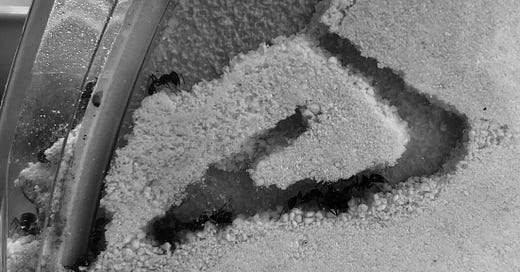“How’s it going?” my husband says to me, in the way one would deliver this phrase to a kid hanging by an overall strap from the monkey bars, lollipop stuck in her hair, her whole existence consumed by the wedgie she’s riding and the singeing tweaks to her scalp with each faint bump of the swinging sucker against her ear, all in a wax-melting patch of sun.
This is how one is obliged to speak to a person with Covid, who moves through time, space, and thought as if from inside a swamp of the cosmos-made-mucous.
When he says this to me, I am staring at the ant farm.
My mouth is open, but since I contracted Covid on my Vacation, I’m wearing a mask in my own kitchen, so he doesn’t technically know for sure that I’m slack-jawed and drooling, though I feel from the look on his face he is nonetheless fully informed.
“Well…” I say, absently, and then I “think” for a bit. He gives up and moves on, into the living room to fold laundry.
“The carrot’s in the graveyard,” I finally say, definitively, by way of report.
I hear him do a spit-take from the other room.
There are many things I have been learning from ants, and I can attest that watching them is an ideal pastime for both a regular brain that doesn’t quite work and a Covid brain that doesn’t work at all.
I got my children an ant farm for Christmas because I wanted one. The other reason is I don’t want to take another vet to the cat to get dead nicely. I mean…
I feel ants have much to teach us, things we’re not necessarily good at, such as share food, and die as needed.
We had to wait until temperatures were warm enough for the Christmas ant-farm residents to be in transit from their home company in California. I suddenly realized it was summer and it was now safe to order our new pets, got very excited, and typed in the voucher number. Then a heat wave hit in conjunction with a postal holiday. When the two tubes of ants arrive, 48 of 50 ants were dead, which should not have surprised me.
Not one to be slowed down by such minor deviations from the plan, I excitedly shook the carcasses and their two live companions into “Ant Mountain,” a small plastic terrarium with a hinged lid. I had already lost the second bag of white “sand,” that came with it, but I filled it half-way with the one remaining bag in a state of dreamy, new-mother expectancy.
I mashed a raisin and dribbled a few drops of water into the hole at the top, closed the lid with a capable snap, and began watching the two survivors of the antpocalypse with a kind of screwy-intense focus that only poets and the astronauts who have to wear diapers tend to enter.
Ant #1 died within a few hours, upon the raisin.
Ant #2 persisted for almost two weeks, and my husband called him Lindy, for reasons unknown until I remembered he had once, as a child, rehabilitated an orphan squirrel that had fallen from a nest, and that creature’s name was Lucky Lindbergh.
Lindy the Ant’s first order of business was a graveyard. He assembled almost all the corpses into one location, on the front of the terrarium, leaving only a few dispersed throughout, probably as memorial-plaque-type dealies. It was a Cormac McCarthy novel inside a plastic terrarium, and I was riveted.
I ordered another tube of ants, and sighed to Lindy, “hang in there, bud,” as I sprinkled his every-other-day water drop onto the textured plastic of Ant Mountain.
I would like to say that he made it, that he held out. And he did, for a long time. But ultimately he succumbed just one day before his peers arrived.
The new ants, about half of whom were alive upon arrival, did exactly what Lindy had done: first, they attended to their dead. There is now a neat ant graveyard on the left-hand side of Ant Mountain.
We have since moved on to such exciting chapters as Tunneling and Moving the Carrot, but I am left wondering what to make of all the death, the casual attitude I can almost have, consumer-style, about sending living creatures via postal mail, and putting them in a plastic tub for my entertainment, and witnessing their handling of their dead almost as if upon a screen— I think so that I don’t have to feel the sadness I’m actually feeling.
I guess what I would say is that the ant drama sort of shifted what I saw, this past week. I saw how things are dying all the time; I saw how delightfully occupied and prolific we can be, just moving sand around, nonetheless.
I saw my own fascination with what I can’t understand. I saw the solemnity, the almost sacred gravity that is possible, even as it eddies, small but not lost, amongst the currents of indifference that our culture looses upon us, dressed as smarts and striving and success.
Whole worlds and eras are happening next to my dirty-ass fruit stand on the kitchen table, and I see no sensible course at all but to stand before them, intermittently slack-jawed behind my mask, and thank the ants, daily, for affording me this— a chance to witness, grain by grain.
In other news that can be filed under Slightly Screwy Meditations, please enjoy this episode of the Writing in the Dark podcast, called Postcard from Jupiter, hosted by Julia Green and Ralph Walker, who recently invited Penny Zang and me to talk with them about the process of writing. It’s a great podcast and I encourage anyone with creative stirrings, however closeted, to listen.






Feel better soon.
All is well ❤️